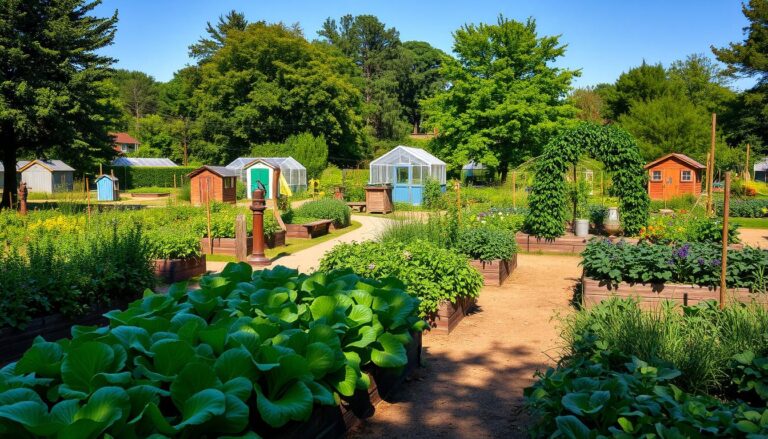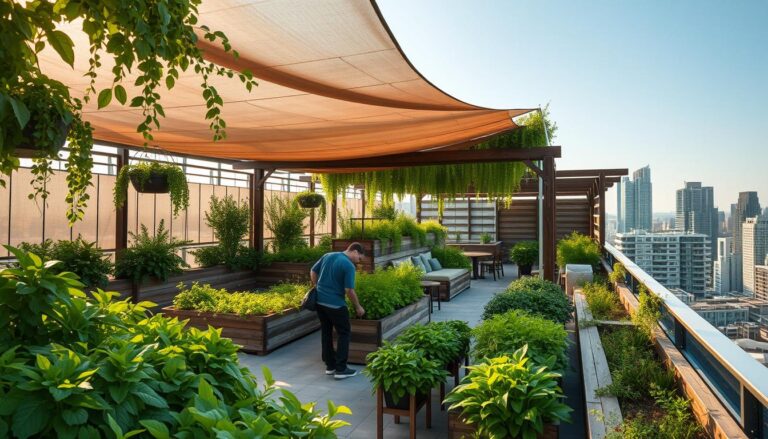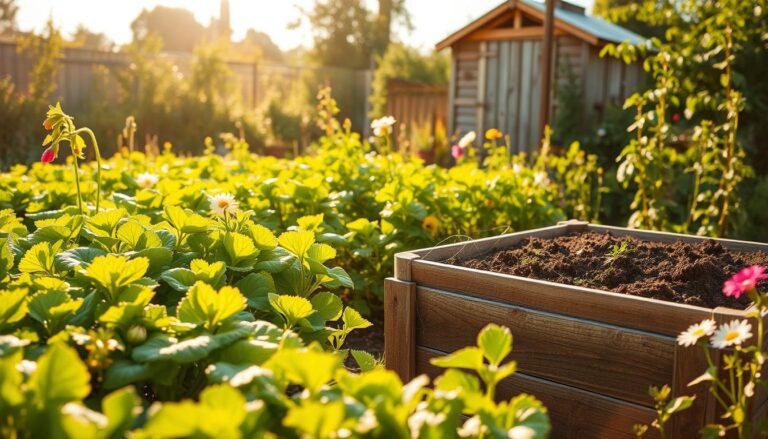To grow a lush and healthy garden, you need more than just good intentions. You need the right nourishment for your plants. Using natural plant food is key to achieving that vibrant outdoor space you dream of.
Chemical-based fertilizers might give quick results, but they can harm the environment and your garden’s health. On the other hand, organic gardening practices create a sustainable ecosystem. They promote soil health and biodiversity.
Choosing the right organic gardening fertilizer does more than feed your plants. It invests in your garden’s and the planet’s health. This approach to gardening is rewarding and good for the environment.
Why Your Garden Needs Organic Nourishment
Organic gardening is key for a healthy and green garden. Using eco-friendly fertilizers helps keep your garden balanced. This is good for your plants and the planet.
Organic gardening has many benefits. One big plus is how it helps the environment.
Environmental Benefits of Chemical-Free Gardening
Chemical-free gardening saves natural resources and cuts down pollution. Eco-friendly fertilizers come from nature, so they don’t harm soil, air, or water. Some main benefits are:
- Less soil erosion
- Cleaner water
- More wildlife
Building Soil Health for Long-Term Garden Success
Organic fertilizers are vital for soil health. They add sustainable garden nutrients to the soil. This makes the soil better for plants, boosts crop yields, and makes your garden stronger.
Safety for Children, Pets, and Wildlife
Organic fertilizers make your garden safer for kids, pets, and animals. They are safe and don’t harm the environment. This lowers the chance of poisoning or harm from harmful substances.
Choosing organic gardening makes your garden healthy and safe. It’s good for now and for the future.
Types of Organic Gardening Fertilizer
Organic gardening fertilizers come in many forms, each with its own benefits. Knowing these types helps gardeners choose the best for their gardens.
Animal-Based Fertilizers
Animal-based fertilizers are made from animal products. They are packed with nutrients that boost soil and plant health.
Manure, Blood Meal, and Bone Meal
Manure is a top choice for gardeners, full of nutrients and microbes. Blood meal, from dried animal blood, adds nitrogen for leafy growth. Bone meal, from animal bones, is rich in phosphorus for roots and flowers.
Fish Emulsion and Other Marine Options
Fish emulsion, from fish waste, is a fast-acting fertilizer. Seaweed extracts offer micronutrients and better soil structure.
Plant-Based Fertilizers
Plant-based fertilizers are key for soil health and plant growth. They come from plants and are used in various ways.
Alfalfa Meal, Kelp, and Seaweed
Alfalfa meal is high in nitrogen for plant growth. Kelp and seaweed products add micronutrients and improve soil’s water retention.
Green Manures and Cover Crops
Green manures and cover crops are plants for soil improvement. Legumes, for example, fix nitrogen, reducing synthetic fertilizer needs.
Mineral-Based Natural Amendments
Mineral-based amendments come from natural deposits. They fix soil deficiencies and boost health.
Rock Phosphate and Greensand
Rock phosphate provides phosphorus for roots and flowers. Greensand slowly releases potassium and micronutrients for plant health.
Lime and Sulfur for pH Adjustment
Lime raises soil pH, while sulfur lowers it. Adjusting pH is key for nutrient availability and plant growth.
Understanding and using these organic fertilizers helps gardeners create a thriving garden. Whether using animal, plant, or mineral-based fertilizers, choose what fits your gardening goals.
Creating Your Own Organic Fertilizers at Home
Homemade organic fertilizers can be made from common household items. This reduces waste and promotes sustainability. It also nourishes your garden and helps the environment.
Compost: The Ultimate Recycled Fertilizer
Composting turns waste into a valuable resource for your garden. It creates a nutrient-rich soil amendment. This improves soil structure and fertility.
Building the Perfect Compost Pile
To build a compost pile, start with a mix of “green” and “brown” materials. “Green” materials include kitchen scraps and grass clippings. “Brown” materials are dried leaves and straw. Layer these materials, keeping a balance between them.
- Include a mix of green and brown materials.
- Maintain adequate moisture.
- Regularly turn the compost pile.
Troubleshooting Common Compost Problems
Common composting issues include bad odors and pests. To avoid these, keep your compost pile balanced and turn it often.
Tips for troubleshooting:
- Avoid adding meat and dairy products.
- Ensure adequate carbon-rich materials.
- Monitor moisture levels.
Worm Composting for Nutrient-Rich Castings
Worm composting uses worms to break down organic waste. It’s great for indoor gardening.
Worm composting is a clean and efficient way to recycle kitchen waste. It turns it into a valuable garden resource.
Kitchen Scrap Solutions
Kitchen scraps can be used as green gardening supplements. Some scraps are especially beneficial.
Banana Peels, Coffee Grounds, and Eggshells
Banana peels are rich in potassium, coffee grounds in nitrogen, and eggshells in calcium. You can add them directly to the soil or compost them.
- Banana peels: Rich in potassium.
- Coffee grounds: High in nitrogen.
- Eggshells: Provide calcium.
Making Compost Tea and Liquid Fertilizers
Compost tea is a liquid fertilizer made by steeping compost in water. It’s a chemical-free plant food that promotes healthy growth.
To make compost tea, steep a bucket of compost in water for 24-48 hours. Strain the liquid and use it as fertilizer.
Application Techniques for Maximum Garden Growth
The secret to a healthy garden is using organic fertilizers right. Knowing when and how to use them makes a big difference. It affects your garden’s health and how much it grows.
Seasonal Timing for Fertilizer Application
When to use fertilizer changes with the seasons. In spring, a organic gardening fertilizer boost helps plants grow strong roots. Summer feeding keeps plants growing fast. Fall fertilizers get plants ready for next year.
Different Plants, Different Needs
Each plant needs different nutrients. For example, veggies and fruits need more eco-friendly fertilizer because they eat a lot.
Vegetables and Fruits
These plants do well with a balanced fertilizer. It has nitrogen, phosphorus, and potassium in equal parts. Regular use, especially when they’re making fruit, improves yield and quality.
Flowers and Ornamentals
Flowers and ornamentals also need organic fertilizers. But, their needs can differ. For example, flowers might need more phosphorus to bloom well.
Application Methods and Amounts
How and how much fertilizer you apply matters a lot. Different methods like top-dressing, side-dressing, and foliar feeding have their own benefits.
Top-Dressing and Side-Dressing
Top-dressing means putting fertilizer on the soil surface. Side-dressing is placing it next to the plants. Both help feed the roots.
Foliar Feeding for Quick Results
Foliar feeding, or spraying fertilizer on leaves, gives a quick nutrient boost. It’s great for times when plants need extra nutrients or when soil can’t provide enough.
By using these methods, gardeners can get the most out of organic gardening fertilizer. This leads to a greener, more productive garden.
Conclusion: Growing a Thriving Garden Naturally
To grow a lush, healthy garden, you need more than just good intentions. You must think carefully about how to feed your plants. Choosing organic gardening fertilizers helps your garden grow well without harming the environment.
Using natural plant food is a simple yet effective way to create a balanced ecosystem in your garden. Whether you make your own fertilizers at home or pick from organic options, the goal is to give your plants the nutrients they need to thrive.
By following these practices, you’ll be on your way to enjoying a vibrant, thriving garden. This garden will benefit both you and the environment. So, start a more sustainable gardening routine today. Watch as your garden becomes a haven of natural beauty.
FAQ
What is organic gardening fertilizer, and how does it differ from synthetic fertilizers?
How do I choose the right organic fertilizer for my garden?
Can I use organic fertilizers on indoor plants, and how often should I apply them?
Are organic fertilizers safe for children and pets?
How do I make compost tea, and what are its benefits?
Can I use kitchen scraps as a natural fertilizer, and which scraps are best?
How often should I fertilize my garden with organic fertilizers?
Are there any eco-friendly, sustainable options for fertilizers that are also cost-effective?

Sortemdia nasceu com o propósito de trazer alegria e oportunidades para todos por meio de sorteios gratuitos de prêmios incríveis. O site tem como missão oferecer experiências acessíveis, divertidas e justas para quem deseja concorrer a produtos, serviços e brindes sem pagar nada por isso. Acreditamos que a sorte pode bater à porta de qualquer pessoa — e no Sortemdia, ela pode chegar com apenas um clique.



